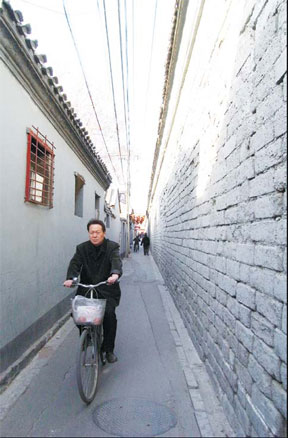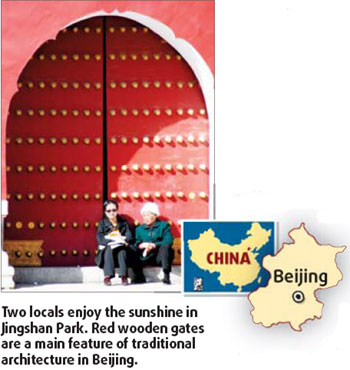I am a Beijinger, I mean Beijinger
By Lin Jinghua, Chinadaily
Updated: 2008-05-23 07:02
/ p. @; v8 l/ X0 S I was born and grew up in Beijing. But I am not considered a real Beijinger, at least by people around me. Although I have always argued that I am a native of the city, my confidence stands shattered by an online quiz on Beijing slang. It has 100 questions of which I answered 70 correct. I'll admit I guessed many of them. But the quiz master has decided that only those with at least 95 correct are real Beijingers. I was deemed just a relative of the city.  A typical hutong near Shichahai Lake in Beijing. Photos by Lin Jinghua |
I have to say that I have never heard of many of them. A friend of mine says they are only popular in the hutong (small alleys) downtown or inside today's second ring road, which used to be the city wall. I am not alone in Beijing. Many Beijingers today are those born and raised in this city after our parents moved here from across the country. Being an ancient capital spanning six dynasties, Beijing has long been a melting pot for different cultures. Not only has it been ruled by the Han people but also the Mongolians and Manchu people. In the 1950s, many young people like my parents came to work in the capital and start their families here. They brought with them the different cultures of their hometowns. When it came to the 1980s, more and more people began to seek their fortune here. And this trend continues. Foreigners have added their bit to stirring this "pot", bringing in their way of living. But this ancient capital has maintained the glory of past dynasties. The Forbidden City, the Temple of Heaven, the Summer Palace and the Badaling section of the Great Wall are must-see Beijing attractions for tourists. I love the hutong alleys stretching from the Forbidden City. Though I was not raised in the old hutong courtyards, I have always had a passion for those gray siheyuan courtyards and am very curious about the life and people behind the small wooden doors. Their lives are quite different from those in the rest of the city. They speak differently with a strong local accent, laden with er. I have kept the habit of strolling in the narrow lanes in downtown areas whenever I have time, though many of the old residences have given way to box-like apartment blocks. Life is quiet back in the alleys. According to historical records, the city used to be connected by more than 6,000 hutong alleys. The hutong-style dwelling started in the Yuan Dynasty (1279-1368). The gray courtyard residence stood in striking contrast to the bright yellow roof and red wall of the Forbidden City. The hutong alleys are rapidly succumbing to the city's development. The ones remaining are a big draw for residents and outsiders. The small lanes near the Shichahai Lake area have become one of the hot spots for tourists. They may find taking a tricycle for a two-hour hutong tour attractive, but I suggest turning into an ordinary lane along any street in Dongcheng or Xicheng districts. The doors are usually open. Don't hesitate to drop in. Beijingers are very friendly. They may tell you a story about their courtyards or treat you to a cup of tea. 
Beijing food is a mix of different cultures. Hot-pot mutton brought by Kublai Khan is one of the city's winter favorites. Roasted Peking duck is as well-known as the Great Wall. Beijing gathers the masters of the four famous cooking styles of the country including Shandong, Huaiyang (in the lower reaches of the Yangtze River), Sichuan and Cantonese. Many foreign chefs have added their own unique styles. But I wouldn't recommend any royal cuisine or snacks. They look good but taste...oh well! Beijing is an exciting place to stay, though it is hit by sandstorms in the spring, is clogged with traffic and is overflowing with people. I enjoy taking a stroll in the Summer Palace after sunset when the tourists have left. I can find small and nice eateries to satisfy my taste buds. There is the traditional Chinese cuisine, exotic tastes from abroad, or the popular fusion foods to choose from. I never feel bored in the evenings with so much on offer on stage, in concert halls and in theaters. Even if nobody believes I'm a real Beijinger, I think I'm a very close relative of the city. |